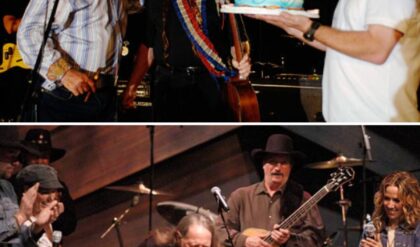Galadriel (Morfydd Clark) can kick ass, when she wants to. Take The Rings of Power’s climactic closing fight in episode 4, where she takes on a couple dozen orcs all by herself. You might ask yourself: If she alone can kick, shoot, stab, and generally beat this many uruk singlehandedly, why wouldn’t her whole party of five stay and fight with her?
You might side with Elrond, who practically spits when he says she stepped up purely to make sure her precious ring of power makes it to safety. I’ll allow that! Rings do weird things to people in Middle-earth. The better thing to ask — I think, anyway — is: How many of those nice orcs had families? And perhaps, more importantly, will Rings of Power ever stoop to care?
Ostensibly, the show has been paying a lot of lip service to the humanity (to borrow a phrase) of the orcs, primarily through its portrayal of Adar. In the first season, Adar held firm against Galadriel’s condemnation of him and his uruk, arguing that what they wanted was the same thing as her: a world without Sauron or Morgoth. Adar believes he killed Sauron after the mistreatment of the orcs, something we see him do in the opening of season 2. Later in the premiere episodes, Adar comforts an orc with a child, assuring them that they should hold out hope, even with the rumors of Sauron’s return.
The dimensionalizing of orcs is one of many things that sums up “kind of the whole show” in a nutshell, co-showrunner Patrick McKay said during a press event in August. “The idea that orcs were bound to [Sauron’s] will once he had the ring, indicates that maybe they were something other than that before. And that’s tantalizing, and seasons of television can grow out of that gulf.”

Image: Prime Video
Thus far, the drama of The Rings of Power nods to those ideas, but never really reckons with them. See: Galadriel slicing through a horde of orcs with reckless abandon as a triumph for the elves. Those orcs have families! Lives! Dreams for a future where they don’t have to fight, but rather can sit at home doing orc business in peace! Rings of Power, repeatedly, treats them merely like cannon fodder.
There’s certainly a debate to be had over whether orcs were in fact corrupted, as McKay says, or if Tolkien intended them to be purely monstrous beasties (or even: if the author intended them to be the former, and, in his main works, only wrote them as the latter). But this is a debate for people who care more about the procreation of orcs than me. In my book, the issue is ultimately fairly simple: The show is not adequately balancing the needs of this storyline.
It’s not unlike the problem Star Wars ran into over time. While the stormtroopers started as faceless goons who could easily be deployed to demonstrate both the Empire’s might and our heroes’ skill in dispatching them, the faceless foot soldiers became sympathetic clones, then in the sequel trilogy, child soldiers who might feel conflicted about serving the Dark Side. That’s a lot to put on what are supposed to be disposable impediment characters! And while deepening the lore around them can add a lot of neat worldbuilding, it can also complicate their function in a story.

Photo: Ben Rothstein/Prime Video
Like Star Wars, Rings of Power has a large ensemble, and a sprawling universe (both old and new) to build up. And while the show remains fairly cleareyed about who the bad guys of the tale are, the orcs — and all the curious gray matter of their story in what’s largely black-and-white heroics — are getting lost.
Now that Galadriel is at Adar’s mercy, there’s a little more chance for orcs to get a little bit of a fairer shake. As Sam Hazeldine, who plays Adar in season 2, told us, this is an elf who “has to believe uruk are not simply irredeemably evil.”
“They’re sentient beings, and therefore should not be treated like their lives are worth nothing,” Hazeldine said. “That’s how other characters have treated them so far — Sauron, the elves, look on them with horror and disgust.
“That’s a great injustice, so far as life is concerned, so far as Adar [is concerned].”
It’s something that Morfydd Clark isn’t sure Galadriel fully understands just yet. “I think Galadriel is unsure of the answer [of orcs’ capacity for good],” Clark said. She notes that much of where the elves are now is a story of “living with consequence,” and recognizing their place in the patterns of the world. “The elves have shaped Middle-earth in a way that they do have a responsibility for everything that has happened. And should that spread to the orcs? I don’t know.”
There’s the added difficulty to this all being locked in — we know that by the time the Third Age starts Lord of the Rings as we know it, the orcs have already been corrupted by Sauron, ready to fight, and die, and put meat back on the menu, boys. The way Rings of Power is set up, this should feel like a major downfall, a force for possible good succumbing to the worst of what people believed about them. It should condemn not only the orcs but the elves that pushed them away as monsters. But time is running out, both in Middle-earth and in Rings of Power to make the orcs anything more than an ominous horde. It’s past time we give the uruk their fair due — after all, we have orc babies to consider.
Orcs deserve more rights, maybe?




